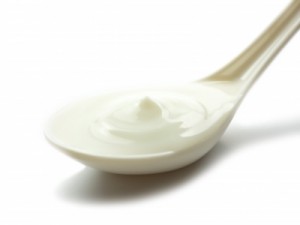Sweet Re-print: Get Cultured!
Hey Sweeties: This is a reprint of an article I wrote for Macheesmo a while back. No less relevant today. Take a peek.
I’m certain you’ve seen them – advertisements for products containing probiotics that promise you great health. But do you really need to buy pre-fab supplements and products to get those health benefits? It turns out that if you eat cultured and fermented foods, you can healthy-up your gut… no pricey supplements necessary.
A little background
Inside your intestinal tract live a ga-gillion live bacteria, viruses, fungi and parasites; good and bad. If you have plenty “good” or “friendly” bacteria in your intestines, you’ll have a healthy inner-ecosystem. “Bad” strains create disease or pathology in the body when they predominate. Collectively, the good and bad microbes are called “flora.”
“Probiotics” are the healthy microflora that lives in your intestines. These flora digest certain sugars, proteins or fats. Some manufacture vitamins B and K, while others break down carbohydrates for energy and increase the bio-availability of minerals. Good intestinal flora can help prevent bloating, gas, and yeast-overgrowth by controlling the pH level of your intestines. Friendly microbes can deprive invaders of nutrients and secrete acids that they can’t tolerate. They also reinforce the mucosal barrier of the intestines, which blocks dangerous pathogens, toxins and allergens. Some good-guys stimulate the immune system by increasing T-cell counts, while others produce natural antibiotic and antifungal substances.
But intestinal flora is fragile and millions can die off when you’re sick or stressed, or with the use of certain medications. Proper nutrition also plays a big part in maintaining a healthy gut. Bad bacteria love refined sugar and animal fat, but if fed vegetables, legumes, and whole grains, good bacteria prosper. And eating cultured or fermented foods can help crowd out unfriendly bacteria and help the healthy stuff prosper.
What are cultured foods, anyway?
Before the advent of convenience foods and modern-day canning, people ate more cultured foods. Food was preserved using the lacto-fermentation process – all it takes is water and salt. Pantries full of pickled veg made those foods available during winter. Today, many of your favorite foods might be cultured or fermented: some breads, cheese, unpasteurized pickles, sauerkraut, kimchi, miso, tempeh, soy sauce, vinegar, yogurt, kefir and kombucha. Lots and lots of other foods can be cultured, including soybeans and myriad fruits and veggies.
Culturing or fermenting a food changes its texture and flavor within a matter of hours. During the process, bacteria enrich and preserve the food and give it a tart-tangy taste. The fermentation process also breaks down elements that are sometimes difficult to digest, such as gluten and sugar, and therefore aids digestion and increases the bio-availability of vitamins.
What does this mean for your body?
Eating cultured and fermented foods can decrease levels of dangerous bacteria in your intestines, help to manage respiratory infections, reduce food allergies, prevent diarrhea and indigestion, and/or correct the balance of microflora in the intestines which enhances your immune system and can help you fend-off illness.
Cultured and fermented foods are also a great counter-balance to the processed food we may consume and the drugs we might take. For example, one dose of broad-spectrum antibiotic will extinguish both the good and bad bacteria in your intestines. A diet high in sugar and processed foods will do the same thing. The mere act of processing a food starts to create an imbalance in the flora that food naturally contains. Because the food industry is concerned with food safety, manufacturers use different methods to “sanitize” or “sterilize” foods – pasteurization, irradiation, the use of chemicals and preservatives, flash heating and microwaving all destroy both good and bad natural micro-organisms found in food.
Cultured and fermented foods can provide you with a complete spectrum of those micro-organisms on a daily basis. Eating these superfoods can be more effective than taking one of those expensive and dubiously-effective probiotic supplements you find on store shelves. Unlike their supplement-counterparts, cultured foods naturally provide dozens of species of bacteria, as compared to five or maybe 10 different species in a supplement. Some say that sauerkraut alone contains 300 species!
Want a piece of this action?
Eat yogurt. There are yogurts made from goat, soy and rice milk if you can’t tolerate cow’s milk. Be aware that many varieties of yogurt are high in added sugars, which feed the bacteria you don’t want to encourage, like yeast. It’s best to get plain yogurt and add fresh fruit or a little jam or honey as sweetener. Check the label and be sure it says “live cultures,” otherwise there is no benefit.
Eat naturally fermented vegetables and pickles. Note that many pickles and sauerkrauts are made with vinegar and/or are pasteurized so they are devoid of any beneficial bacteria. More and more supermarkets and natural food stores now offer unpasteurized, fermented vegetables. And it’s not difficult to make your own pickles and chutneys – and it’s a great way to preserve the summer’s bounty.
Fermented soy products give you protein and probiotics, together. Try natto, tempeh, stinky tofu and/or miso. Just make sure that the products you buy are unpasteurized and naturally fermented so they’ll contain live enzymes.
Use fermented condiments and drink fermented beverages. Unsweetened low-fat kefir makes a great smoothie base. Serve your food with sauerkraut or kimchi on the side, or spread fermented mayonnaise on your sandwiches and dip your chips in fermented salsa.
Get creative and experiment. Try making kefir ice cream, sourdough crackers or fermented coconut milk. Try a traditional Japanese breakfast of natto with rice. Visit an Ethiopian restaurant and sample some of their fermented injera bread. Make dilly beans or fruit chutneys from your garden or CSA-share this summer. The options are endless… but if you go the DIY-route, please exercise caution. Under certain circumstances lacto-fermented foods may go off and can make you sick, so gain an understanding of how this can happen and how to avoid it.
By any means, seek out these foods. If you are serious about boosting your immunity and increasing your overall health, incorporating traditionally cultured and fermented foods to your diet is a must.
Update 3/2012: Although you don’t necessarily need a supplement, when we got back from 1 week of eating dangerously on vacation, I wanted to amp things up in the gut, so I tried a new one. Since then, I’ve been digging GoLive’s Probiotic & Prebiotic supplement. I get the unflavored variety and add it in with my green smoothie in the a.m. It’s flavorless – you don’t even know it’s there . . . ’til it starts working its magic. And then you feel fantastic.
Image: Master isolated images / FreeDigitalPhotos.net
© 2012, Sarah. All rights reserved.
-
Wendy











